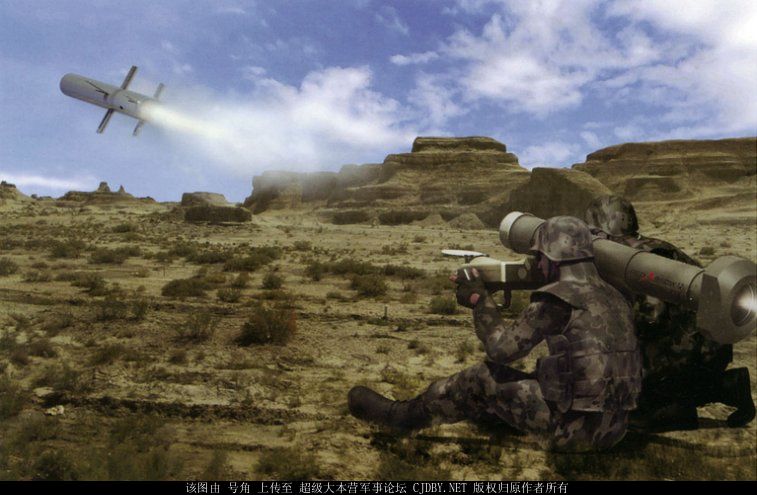


In a display of ambitious Chinese modern weaponry exports, new photos of the HJ-12 anti-tank guided missile (ATGM) were recently featured at a major defense exhibition in late June 2014.
The HJ-12 has a range of 4,000 meters in daytime, and 2,000 meters at nighttime through using imaging infrared (IIR) sensors. Man-portable, IHS Janes states that the complete 22 kg HJ-12 system includes a 5 kg IIR and electro-optical targeting sight, as well as the 15kg, 13.5 cm wide, 98 cm long missile itself. It has “fire and forget” capability, which means the HJ-12 will automatically track the target tank without any further operator input. Another important modern feature is the top down attack capability; the ATGM flies up in the last seconds of flight to then dive into the tank’s turret roof, where armor is usually the weakest. In direct flight mode, the HJ-12’s tandem warhead can penetrate up to 1,100mm of steel armor, which is plenty for many current tanks. The outcome is a weapon that provides infantry in urban combat, amphibious and airborne missions a quick, long range capability to ambush and defend against even the most modern enemy tanks equipped with reactive armor.

The HJ-12 is made by NORINCO, China’s largest producer of tanks, other armored vehicles, artillery and infantry weapons. The missile may have its roots in the AFT-11, a Chinese ATGM project dating from around 2012. Chinese media suggests that the HJ-12 is already in the midst of being fielded in the People’s Liberation Army, vastly upgrading Chinese infantry anti-tank firepower over the previous PF-98 120mm anti-tank rocket launcher. Like its Israeli Spike counterpart, the HJ-12 could also become the basis for a family of very light, air and vehicle launched, demolition, and long range (20 km+) missiles.
What is most notable about the photos, however, is that they were displayed at the Eurosatory 2014 event in France. The locale of an international arms trade show indicates that the HJ-12 is soon likely to be exported. The missile is a significant upgrade to what has been available on export markets to non-US allies, comparable to modern ATGMs like the U.S. Javelin, Israel’s Spike and the Japanese Type 01 LMAT. Thus, the upgrade in antitank capabilities won’t just occur in China but also on Middle Eastern and African battlefields. This matters not just for potential conventional wars of today and tomorrow, but also the wave of civil wars in such regions. While non-state actors are unlikely to directly purchase the HJ-12, there is a pattern of proliferation, theft, and diversion of such ATGMs from government customers to insurgent groups. Such a new generation of missiles like the HJ-12 on the market will give insurgents and other armed groups a deadly, easy to use, and very portable weapon against modern tanks.
